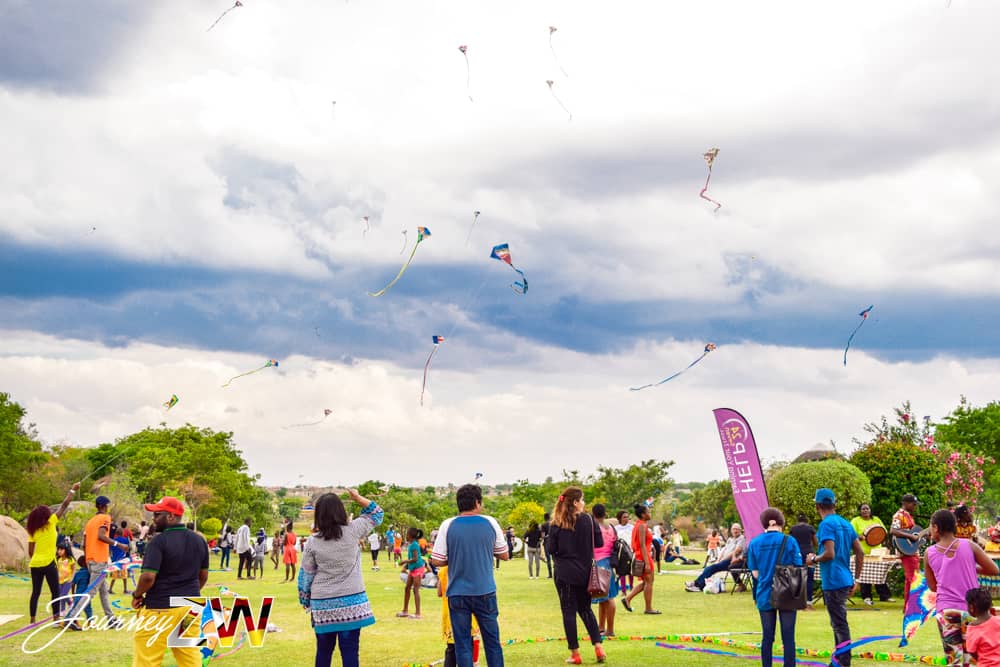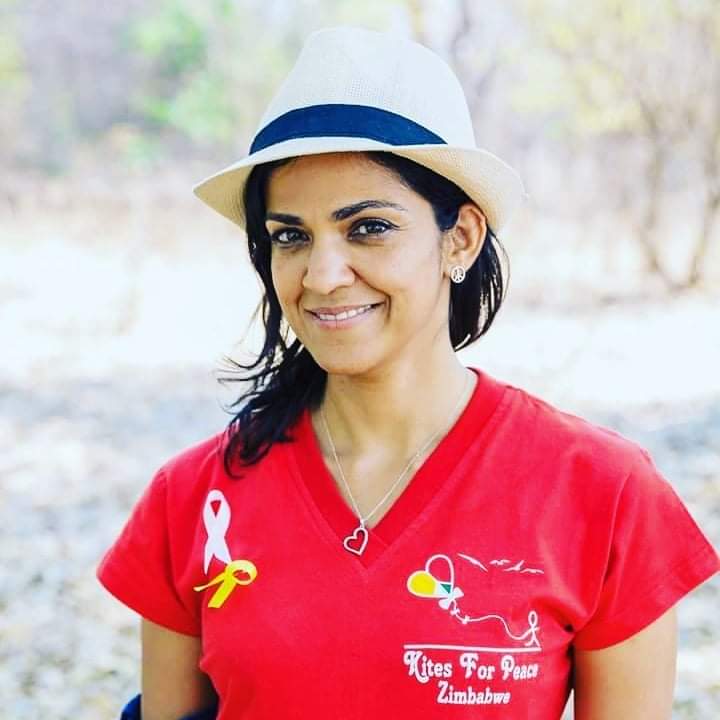Meet Suraiya Essof, a retired teacher, mother, entrepreneur and the Director of Kites for Peace Organization. While she is modest in her introduction, only describing herself as a mother, her achievements and accolades are anything but. She has a degree in Industrial Psychology and a postgraduate diploma in Education, having spent a considerable portion of her career teaching. Despite having retired, she still has a strong passion for education. These days, she juggles her furniture business (which she established 9 years ago) with her Board duties at Ignite Youth Foundation. As the founder and Director of Kites for Peace Organization, she was recently named as one of “40 Great Zimbabweans” in the Great Zimbabweans Project 2020. The Guardian Newspaper profiled Suraiya among its list of “20 Outstanding Women of Zimbabwe“. Suraya also boasts the Social Entrepreneur of the year award by Zimbabwe Community News Awards in 2021. In an interview with Suraiya, she revealed much of her philosophy about volunteerism and social impact.
Suraiya’s source of inspiration
With such a stellar background, I was quite interested in finding out what drives her and how she keeps a level head in the midst of challenges. Her source of inspiration comes from an innate desire to do more and be better than the previous day. Personal loss may have shaped her perspectives but it is the journey of motherhood that has given her a deeper understanding of her purpose and the meaning of life. According to Suraiya:
Being a mother, you become very cautious about your legacy. What are you going to leave this world, what are you going to leave your children. This really became marked when I lost my own mother. You become very much aware of your appearance but also aware of your own mortality. This kickstarted me to say there is a difference that I would like to make.”
Suraya Essof
The COVID-19 Pandemic and volunteerism
According to Suraiya, the COVID-19 pandemic adversely affected her because the kite festivals could not continue during the lockdown. This was a major setback to them. The kite festivals had always been a flagship event of their organization. They used the kite festivals to cement their peace message to the community. Launched in 2014, the kite flying festival was launched in Zimbabwe by Suraiya after she came came across a poster on Facebook for a world record breaking attempt of the number of kites flown simultaneously called Kites for Peace. She pledged to mobilize people to fly kites for this cause and in that year, 48 kites were flown in Zimbabwe as a part of this “Kites for Peace” initiative. Friends and family picnicked, flew kites and enjoyed the serenity of Lake Chivero at the Jacana Yacht Club. They also used the event to give physical exposure to their charity.
The following year, the kite festival had 1000 attendees and in 2017 that number doubled to 2000! Both of these events were held at Haka Game Park. Through the years, the festivals have continued to gain traction and awareness recording significant numbers of attendees who fly kites for peace. With the COVID-19 pandemic, the festivals were crippled as crowds could not gather to commemorate the festivals as they had always done in previous years. This has forced the organizers of the festival to launch an online kite flying event.

The level of volunteerism in Zimbabwe
On the issue of volunteerism in Zimbabwe, Suraiya stated that it was difficult to accurately assess the true level of volunteerism. She, however, noted that many community organizations are volunteer-based organizations founded by volunteers.
According to her, there is still a very high level of volunteerism in Zimbabwe despite the prevailing challenging economy. An economy where people have a job and a side hustle leaves little time for volunteering. Everyone seems to be putting in extra hours at work, leaving them little to no free time. The reality is that life is quite hectic and Suraiya further notes that while many people would like to be involved with something, their priorities seem to change with the prevailing circumstances. Despite this, more and more people who would like to volunteer but cannot for various reasons tend to either donate money or offer other in kind support.
“Volunteerism is something that I promote and that’s why it’s called the Zimbabwe Cares Network. All you need to do is to care. If you do not have any money to give you can care in another way. You can share your time, you can share your knowledge”
Suraya Essof
Through the Zimbabwe Cares Network, Suraiya and her team encourage people to share their skills and resources. They have adopted a different approach that gives ownership to the communities that they assist. They work together with them to find out their immediate needs and using that information approach other members within the community and beyond who are looking for ways to volunteer or offer support. They have established a donation bank whereby people can send in materials and items that they no longer use and these can be distributed to other members of the community depending on their needs.
Ways to instill a culture of volunteerism
When it comes to some ways that can be used to promote a culture a volunteerism in Zimbabwe, Suraiya believes that the key lies in encouraging people to help change the narrative. Instead of people acknowledging and complaining about a problem, they should actually do something about it. According to Suraiya, volunteerism is every bit about advocating for a a cause, as it is about helping oneself. She notes that often times many people feel disempowered and believe that things are beyond their own control. They have bought into the idea that it is only the government and the elite who can make a difference. This could not be further from the truth as she thinks that once people start realizing their potential and ability to change situations and things, then it would also help them to find inner peace.
“I think that the reason that people are so depressed is because they feel that they lack this power. They lack the power to change things within themselves, to change things for others”
Suraya Essof
According to Suraiya, everybody has a dream of changing the world. However, that dream must start in our own homes, neighborhoods, and communities. She notes that often times, we are more concerned with global events than those things happening right at our doorstep. The mentality that we ought to adopt is that of thinking globally and acting locally. In so doing we can galvanise support from other like minded people and change situations one at a time.
Is volunteerism a calling?
Suraiya believes that volunteerism should be absolutely organic and natural. Rather than being an addition to our life, volunteering should be our way of life. According to her, when she was growing up, volunteerism started when one was very young and getting children involved was important. You did not need to be rich, muscular or even leave your community or town.
“Some of the best volunteers are in wheelchairs and they are amazing, so it’s really for anybody and really for your own good.”
Suraya ESSOF
Suraiya challenges all of us to stop complaining about our individual and collective problems by changing our attitudes. It is rather easy to say life is unfair when faced with myriads of problems as society has been conditioned to look at the negative. It is as though we are drawn to the negativity. All you have to do is to turn on the television, tune into the radio or log on to the internet and you are hit with a barrage of negative news. Very rarely would you see or hear about something good. Even then, it does not get much air play. What is it that they say about if a dog bites a man, it isn’t news but if a man bites a dog….The point being that there is need for an attitude shift. Suraiya thinks that if we would look at problems as opportunities rather than life’s inconveniences, then we could begin to apply ourselves and do more. Each one of us is endowed with talents and gifts. The problem is many of us have been conditioned to wait for someone else presumably more talented, vocal, powerful, smarter and so forth, than us to spearhead change for us. Nothing could be further from the truth. No one is in a position that is too small to make a difference. As long as you have breathe in your body, you can make that difference that you so desperately seek.
“We always say that there is always something you can do. Do not wait for Ministry to give money to the hospital, do not wait for the powerful. You have the power. Do not wait for those you perceive have the control because you are also in control. When you start making a difference, you start feeling better yourself that you are doing something. You are not just complaining, but you are part of the solution, and making a difference.”
Suraiya Essof
Speaking with Suraiya brought home many home truths that we sometimes conveniently forget in our pursuit of greatness or whatever else it is that we seek. Often times many of us think that in order to make a difference, it is imperative that we do something big that will attract a lot of attention or recognition. This then leads to self doubt whereby we start to question our capabilities. Suraiya reminds us of the importance of small actions and gestures. Every global or regional initiative/change movement had its humble beginnings in a seemingly small idea championed in a village, community or even town. It is from there that the small actions became the building blocks of greater impact.
“We look at all these amazing people and we say wow! look at this person they doing this and that. You can do that too, you can also do that. It does not have to be big gestures, it can be small gestures. There is lots of fun things you know”
Suraya Essof
__________________________________________________________________________________________________________________
IVolunteer International is a 501(c)3 tech-nonprofit registered in the United States with operations worldwide. Using a location-based mobile application, we mobilize volunteers to take action in their local communities. Our vision is creating 7-billion volunteers. We are an internationally recognized nonprofit organization and is also a Civil Society Associated with the United Nations Department of Global Communications. Visit our profiles on Guidestar, Greatnonprofits, and FastForward.


